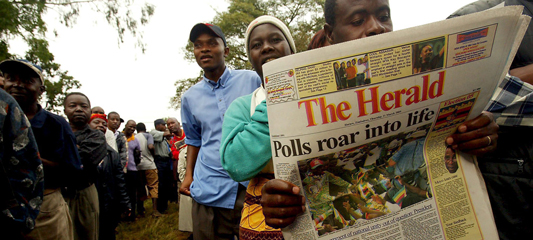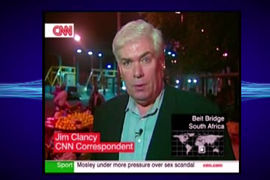Not getting the story
The Listening Post on the battle for information inside and outside Zimbabwe.

 |
| Local newspapers such as the Herald have been very pro-Mugabe [EPA] |
The Listening Post host Richard Gizbert takes a look at how local, African and international news organisations tackled the problem of reporting on Zimbabwe’s controversial elections.
The recent elections in Zimbabwe created a classic news divide.
Robert Mugabe accuses international media organisations of being old style colonialists while those organisations – based mainly in the West – accuse the Zimbabwean president of suppressing free speech.
Despite it being one of the biggest news stories in Africa so far this year, when Zimbabweans went to the polls at the end of last month the majority of international news channels found themselves on the outside looking in.
Banned by the Mugabe government, organisations such as the BBC and CNN were forced to report on the elections from the border with South Africa.
| Listening Post | ||
|
There were exceptions. Al Jazeera was the only international news channel officially accredited to cover the election while some broadcasters, including the BBC and another British channel, Sky, were able to get teams inside Zimbabwe, albeit illegally.
Guguletho Moyo, a Zimbabwean lawyer working for the international bar association, says the large amount of money and resources invested into covering the elections from South Africa reflects the unusual amount of attention paid to the country in the west compared to other African nations.
“People were trying to cover the election from outside but often they were speaking to commentators who were not in Zimbabwe,” she says.
Radio friendly
“It was a bit strange because you think that they could do the same thing from London and I imagine the amount of resources sending these very senior reporters to Johannesburg reflects the extraordinary amount of interest in Zimbabwe.”
For those inside Zimbabwe the news was mainly supplied by the country’s state-run media which is controlled by Mugabe’s Zanu PF party.
However with few Zimbabweans able to afford televisions, let alone computers, many turn to the radio for their news where alternative voices can be found – like SW Radio Africa which broadcasts into Zimbabwe from London.
 |
| Channels such as CNN were forced to report from outside Zimbabwe |
“The surprising thing working here is that we call Zimbabwe every day looking for information but over the last few days it’s been the other way around,” says Lance Guma, a producer at the station. “People at home want information from you, even though you’re outside.”
“There is a shortage of basic commodities, but when it comes to information there is also a shortage of information so people turn to the black market which in some cases might be pirate radio stations like us.”
Some experts also claim that while the Mugabe government has attempted to control the flow of information a variety of opinions are still available and the local population has a thirst for independent views.
“In spite of President Mugabe having clamped down very heavily on private and independent media in that country, arresting journalists, torturing them, banning them from broadcasting, Zimbabwe has one of the most vibrant opposition media, let me call it critical media,” Vincent Magombe from the Africa Inform International group says.
Gerry Jackson, the station manager of SW Africa, says the adoption of new technology is helping the spread of information within Zimbabwe.
“We send news headlines in on SMS messaging every evening. And we’ve got 200 people every day on average asking to be added to the address list and we’re sending to about 15,000 people now,” she says.
Between the lines
“And even people in rural areas have mobile phones, so the technology is helping the free flow of information, so at least we do feel that we’re allowing some people to get instant breaking information.”
Moyo says that while the state-run press are widely regarded as simply a mouthpiece for Mugabe and the ruling party, Zimbabweans continue to turn to it for information and have instead learnt to read between the lines.
During the run-up to the election there was little need for that, with newspapers like the Herald raising the spectre of Zimbabwe’s colonial days.
On election day it warned that if opposition leader Morgan Tsvangirai won “it will not be the power to lead the people of Zimbabwe to the promised land … but the power to sign away Zimbabwe to Britain and America’s multinational corporations”.
 |
| Stations such as SW Africa are providing independent coverage from abroad |
The paper continued in its role as chief cheerleader for Mugabe with an editorial calling on Zimbabweans to stick with him in a second round election.
“Let us fight the British and her cronies in this do-or-die presidential re-run” it declared.
It was not just Zimbabwean and Western news media that was prevented from reporting. African broadcasters were also refused entry.
“One of the reasons that they gave us [for refusing media accreditation] was that we were a Kenyan media agency and they felt the media was responsible for much of the violence in Kenya following the election in December,” Salam Amin, the head of the Kenyan agency Camerapix, says.
Questions remain over what kind of media will exist in Zimbabwe once the dust and controversy have settled over the current disputed election.
“I think the media is the mot powerful tool of change on this continent but in Zimbabwe it has been suppressed for so long it is going be very difficult for them to get out of that – and not under the current regime,” Amin says.
Forced to work from London Gerry Jackson says she would like to return home to work but that it will be difficult because “you are basically rebuilding a country from scratch”.
“It [Zimbabwe] has been totally and utterly destroyed,” she says.
“But of course a lot will depend on the next government. Are they going to open the airwaves? Are they going to create a free media environment? Who knows?”
To contact us or leave a comment click on ‘Send your feedback’ at the top of the page.
Watch Al Jazeera English programmes on YouTube
Join our debates at the Your Views section of the site.
